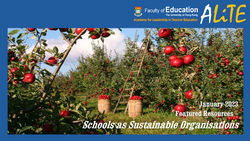ALiTE January Resources - Schools as Sustainable Organisations
Others
Date
January 01 - February 28, 2023 (Sun-Tue)

Amid post-pandemic, as we aim to reconcile the ideas of the "new normal," schools may require revisiting what counts as sustainable organisations. Too often, schools celebrate the accumulation of standardised knowledge over cultivating creativity and adaptability, individual achievement over community-oriented efforts, and outcomes over processes. However, the purpose of schooling is not to socialise youth in an academic competition but to prepare them for participation in a variety of communities that matter to them (Eckert et al., 1997). Furthermore, schools are encountering challenges in responding to shifting societal expectations, increasingly diversified student populations and faculty generations, changing local conditions, and entropic forces imposed by the global pandemic. To navigate these challenges, all members (school leaders, teachers, students, parents, and other stakeholders) within schools must function as organisations. Therefore, it is timely that we reflect on schools as sustainable organisations.
The concept of schools as sustainable organisations builds upon the premise that schools are institutionally grounded social organisations and that they also are ecological systems embedded in a dynamic environment. On one hand, schools are organised to build capacities for social participation (Bidwell, 2006). On the other hand, schools must be self-conscious, reflective organisations to cope with social and demographic dynamics. From this perspective, we envision sustainable schools as organic organisations that foster joint learning and prepare all members for meaningful participation in local and global communities (Eckert et al., 1997).
Since communal learning is vital for collectively adapting to new situations (Stoll, 2020) and building meaningful social connections (Eckert et al., 1997), for schools to function as sustainable organisations, collaborative learning must retain a central position. In schools as communities of engaged learners, all participants have easy access to learning resources and are prepared to participate in various communities that are meaningful to them (Eckert et al., 1997). All members work together toward a shared vision and mission; everyone can make an impact within and beyond their communities (Kools et al., 2020; Tichnor-Wagner et al., 2016). To foster continual learning, a strong and supportive professional learning community is required where individual and collective efforts are cohesively intertwined (Tuli & Bekele, 2020). School leaders must convey expectations for all members, provide time, space, and resources for active and collaborative learning, and build mutual trust and open communication among various stakeholders (McLaughlin & Talbert, 2006). Concurrently, all teachers must collaborate, deeply interrogate, and actively improve their practices as they share experiences and reflect upon varied perspectives (Tuli & Bekele, 2020).
The Academy for Leadership in Teacher Education (ALiTE) has curated a list of resources for educators, researchers and the general public who are interested in education-related information and tools, including school examples, internet resources and scholarly contributions. The topic for January is “Schools as Sustainable Organisations”. Check out the curated resources at https://www.alite.edu.hku.hk/post/schools-as-sustainable-organisations and remember to bookmark it!
#hkueducation #teachersofig #teachereducation #ALiTE #sustainableschools #schoolsassustainableorganisations #collaborativelearning #sharedvisionandmission
